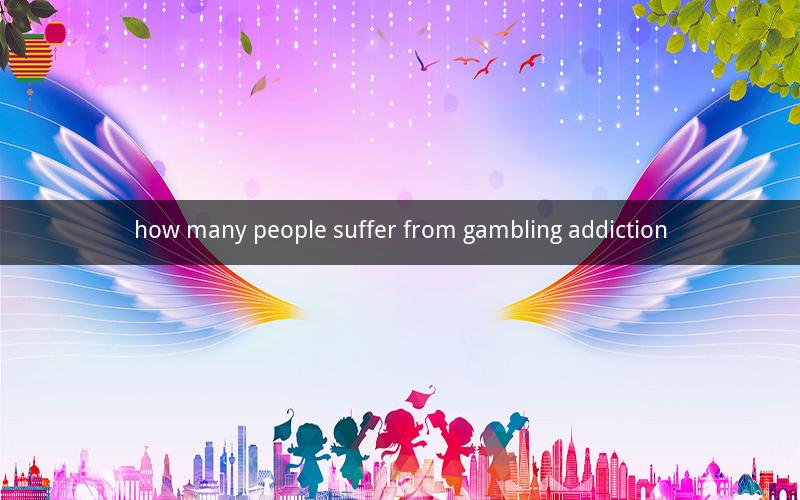
Table of Contents
1. Introduction to Gambling Addiction
2. Understanding the Prevalence of Gambling Addiction
3. Factors Contributing to the Problem
4. Societal and Psychological Impacts
5. Diagnosis and Treatment of Gambling Addiction
6. Preventive Measures and Support Systems
7. Case Studies and Real-Life Examples
8. Conclusion
1. Introduction to Gambling Addiction
Gambling addiction, often referred to as compulsive gambling or pathological gambling, is a condition characterized by an inability to control or stop gambling despite harmful consequences. It affects individuals across various socioeconomic backgrounds and age groups. This section provides an overview of gambling addiction, its symptoms, and its impact on individuals and society.
2. Understanding the Prevalence of Gambling Addiction
The prevalence of gambling addiction varies across different regions and demographics. According to various studies, the estimated prevalence of gambling addiction ranges from 0.5% to 2.5% of the general population. However, these figures may be underestimated due to underreporting and the stigmatization associated with the condition.
3. Factors Contributing to the Problem
Several factors contribute to the development of gambling addiction, including genetic predisposition, environmental influences, and psychological factors. This section explores these factors and their interplay in the development of gambling addiction.
- Genetic predisposition: Research suggests that genetics play a role in the development of gambling addiction. Individuals with a family history of gambling addiction or other addictive behaviors may be at a higher risk.
- Environmental influences: Exposure to gambling opportunities, such as casinos, racetracks, and online platforms, can increase the likelihood of developing a gambling addiction. Peer pressure and societal acceptance of gambling can also contribute to the problem.
- Psychological factors: Individuals with certain personality traits, such as impulsivity, thrill-seeking, and a need for control, may be more susceptible to developing a gambling addiction.
4. Societal and Psychological Impacts
Gambling addiction has significant societal and psychological impacts. The following sections discuss these impacts in detail.
- Societal impacts: Gambling addiction can lead to financial problems, increased crime rates, and strained relationships. It can also have negative consequences for communities, including decreased public services and increased healthcare costs.
- Psychological impacts: Individuals with gambling addiction may experience depression, anxiety, and other mental health issues. They may also develop a sense of shame and guilt, which can exacerbate their addiction.
5. Diagnosis and Treatment of Gambling Addiction
Diagnosing gambling addiction involves assessing an individual's gambling behavior and its impact on their life. Treatment options include cognitive-behavioral therapy, medication, and support groups. This section provides an overview of the diagnostic and treatment process for gambling addiction.
6. Preventive Measures and Support Systems
Several preventive measures and support systems can help reduce the incidence of gambling addiction. These include public education campaigns, stricter regulations on gambling advertising, and the establishment of self-exclusion programs. This section discusses these measures and their effectiveness.
7. Case Studies and Real-Life Examples
This section presents case studies and real-life examples of individuals who have struggled with gambling addiction. These stories highlight the challenges faced by individuals with this condition and the importance of early intervention and treatment.
8. Conclusion
Gambling addiction is a serious condition that affects many individuals and their families. Understanding the prevalence, factors contributing to the problem, and the available treatment options is crucial for addressing this issue effectively. By implementing preventive measures and support systems, we can help reduce the incidence of gambling addiction and improve the well-being of affected individuals.
Questions and Answers
1. What is the difference between problem gambling and gambling addiction?
- Problem gambling refers to any gambling behavior that causes distress or harm, while gambling addiction is a more severe form of problem gambling characterized by an inability to control gambling behavior.
2. How can I recognize the signs of gambling addiction in myself or someone else?
- Signs of gambling addiction include preoccupation with gambling, loss of control over gambling behavior, increased debt, neglect of personal responsibilities, and a desire to stop gambling but being unable to do so.
3. What treatment options are available for gambling addiction?
- Treatment options for gambling addiction include cognitive-behavioral therapy, medication, and support groups. Some individuals may benefit from a combination of these approaches.
4. Can gambling addiction be cured?
- While there is no cure for gambling addiction, it can be effectively managed with proper treatment and support.
5. How can I prevent gambling addiction?
- To prevent gambling addiction, it is important to be aware of the risks associated with gambling, set limits on gambling activities, and seek help if you or someone you know is struggling with gambling-related problems.
6. Are there any support groups available for individuals with gambling addiction?
- Yes, there are several support groups available for individuals with gambling addiction, including Gamblers Anonymous and SMART Recovery.
7. Can medication help treat gambling addiction?
- Some medications, such as antidepressants and mood stabilizers, may be prescribed to help manage the symptoms of gambling addiction. However, medication alone is not typically sufficient for treating this condition.
8. How can I help a loved one who is struggling with gambling addiction?
- To help a loved one with gambling addiction, it is important to be supportive and non-judgmental. Encourage them to seek professional help and offer to accompany them to appointments or support groups.
9. Can gambling addiction lead to financial problems?
- Yes, gambling addiction can lead to significant financial problems, including debt, bankruptcy, and the loss of personal property.
10. Is it possible to recover from gambling addiction?
- Yes, it is possible to recover from gambling addiction with proper treatment, support, and a strong commitment to change. Many individuals who have struggled with gambling addiction have gone on to lead fulfilling and productive lives.